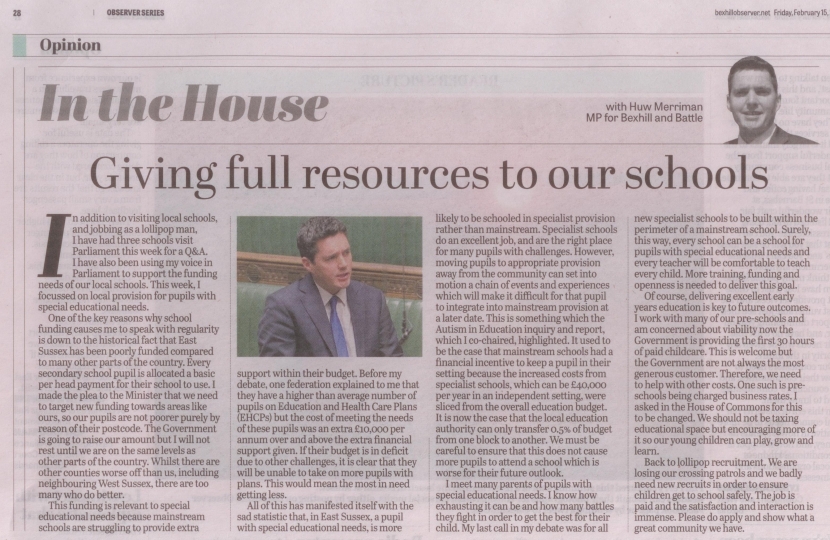
In addition to visiting local schools, and jobbing as a lollipop man, I have had three schools visit Parliament this week for a Q&A. I have also been using my voice in Parliament to support the funding needs of our local schools. This week, I focussed on local provision for pupils with special educational needs.
One of the key reasons why school funding causes me to speak with regularity is down to the historical fact that East Sussex has been poorly funded compared to many other parts of the country. Every secondary school pupil is allocated a basic per head payment for their school to use. I made the plea to the Minister that we need to target new funding towards areas like ours, so our pupils are not poorer purely by reason of their postcode. The Government is going to raise our amount but I will not rest until we are on the same levels as other parts of the country. Whilst there are other counties worse off than us, including neighbouring West Sussex, there are too many who do better.
This funding is relevant to special educational needs because mainstream schools are struggling to provide extra support within their budget. Before my debate, one federation explained to me that they have a higher than average number of pupils on Education and Health Care Plans (EHCPs) but the cost of meeting the needs of these pupils was an extra £10,000 per annum over and above the extra financial support given. If their budget is in deficit due to other challenges, it is clear that they will be unable to take on more pupils with plans. This would mean the most in need getting less.
All of this has manifested itself with the sad statistic that, in East Sussex, a pupil with special educational needs, is more likely to be schooled in specialist provision rather than mainstream. Specialist schools do an excellent job, and are the right place for many pupils with challenges. However, moving pupils to appropriate provision away from the community can set into motion a chain of events and experiences which will make it difficult for that pupil to integrate into mainstream provision at a later date. This is something which the Autism in Education inquiry and report, which I co-chaired, highlighted. It used to be the case that mainstream schools had a financial incentive to keep a pupil in their setting because the increased costs from specialist schools, which can be £40,000 per year in an independent setting, were sliced from the overall education budget. It is now the case that the local education authority can only transfer 0.5% of budget from one block to another. We must be careful to ensure that this does not cause more pupils to attend a school which is worse for their future outlook.
I meet many parents of pupils with special educational needs. I know how exhausting it can be and how many battles they fight in order to get the best for their child. My last call in my debate was for all new specialist schools to be built within the perimeter of a mainstream school. Surely, this way, every school can be a school for pupils with special educational needs and every teacher will be comfortable to teach every child. More training, funding and openness is needed to deliver this goal.
Of course, delivering excellent early years education is key to future outcomes. I work with many of our pre-schools and am concerned about viability now the Government is providing the first 30 hours of paid childcare. This is welcome but the Government are not always the most generous customer. Therefore, we need to help with other costs. One such is pre-schools being charged business rates. I asked in the House of Commons for this to be changed. We should not be taxing educational space but encouraging more of it so our young children can play, grow and learn.
Back to lollipop recruitment. We are losing our crossing patrols and we badly need new recruits in order to ensure children get to school safely. The job is paid and the satisfaction and interaction is immense. Please do apply and show what a great community we have.



